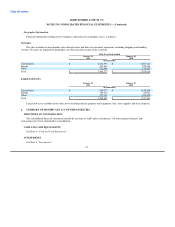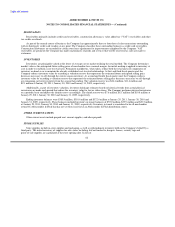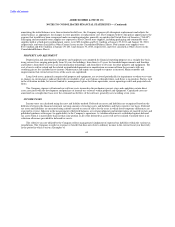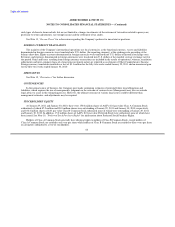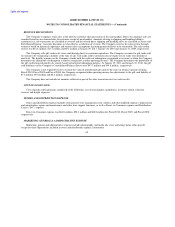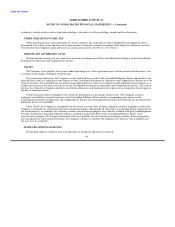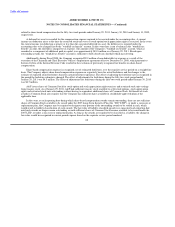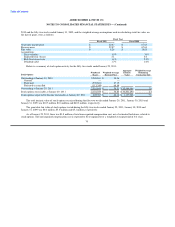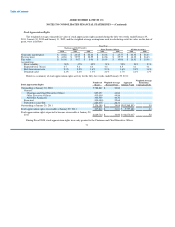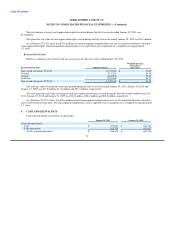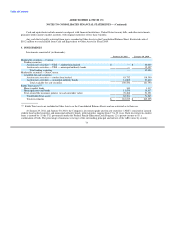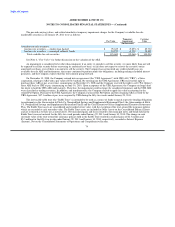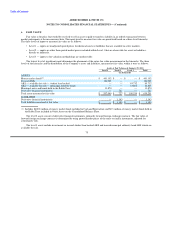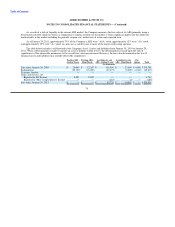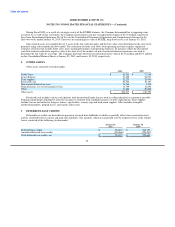Abercrombie & Fitch 2010 Annual Report Download - page 72
Download and view the complete annual report
Please find page 72 of the 2010 Abercrombie & Fitch annual report below. You can navigate through the pages in the report by either clicking on the pages listed below, or by using the keyword search tool below to find specific information within the annual report.
Table of Contents
ABERCROMBIE & FITCH CO.
NOTES TO CONSOLIDATED FINANCIAL STATEMENTS — (Continued)
Plans
As of January 29, 2011, A&F had two primary share-based compensation plans: the 2005 Long-Term Incentive Plan (the "2005
LTIP"), under which A&F grants stock options, stock appreciation rights and restricted stock units to associates of the Company and
non-associate members of the A&F Board of Directors, and the 2007 Long-Term Incentive Plan (the "2007 LTIP"), under which A&F
grants stock options, stock appreciation rights and restricted stock units to associates of the Company. A&F also has four other share-
based compensation plans under which it granted stock options and restricted stock units to associates of the Company and non-
associate members of the A&F Board of Directors in prior years.
The 2007 LTIP, a stockholder-approved plan, permits A&F to grant awards of each type covering up to 2.0 million shares
annually, plus any unused annual limit from prior years, for the type of award of A&F's Common Stock to any associate of the
Company eligible to receive awards under the 2007 LTIP. The 2005 LTIP, a stockholder-approved plan, permits A&F to annually
grant awards covering up to 250,000 shares of A&F's Common Stock, plus any unused annual limit from prior years, for the type of
award to any associate of the Company (other than Michael S. Jeffries) who is subject to Section 16 of the Securities Exchange Act of
1934, as amended, at the time of the grant. In addition, any non-associate director of A&F is eligible to receive awards under the 2005
LTIP. Under both plans, stock options, stock appreciation rights and restricted stock units vest primarily over four years for associates.
Under the 2005 LTIP, restricted stock units typically vest over one year for non-associate directors of A&F. Stock options have a ten-
year term and stock appreciation rights have up to a ten-year term, subject to forfeiture under the terms of the plans. The plans provide
for accelerated vesting if there is a change of control as defined in the plans.
Fair Value Estimates
The Company estimates the fair value of stock options and stock appreciation rights granted using the Black-Scholes option-
pricing model, which requires the Company to estimate the expected term of the stock options and stock appreciation rights and
expected future stock price volatility over the expected term. Estimates of expected terms, which represent the expected periods of
time the Company believes stock options and stock appreciation rights will be outstanding, are based on historical experience.
Estimates of expected future stock price volatility are based on the volatility of A&F's Common Stock price for the most recent
historical period equal to the expected term of the stock option or stock appreciation right, as appropriate. The Company calculates the
volatility as the annualized standard deviation of the differences in the natural logarithms of the weekly stock closing price, adjusted
for stock splits and dividends.
In the case of restricted stock units, the Company calculates the fair value of the restricted stock units granted using the market
price of the underlying Common Stock on the date of grant adjusted for anticipated dividend payments during the vesting period.
Stock Options
The Company did not grant any stock options during the fifty-two weeks ended January 29, 2011. The weighted-average
estimated fair value of stock options granted during the fifty-two weeks ended January 30,
69




